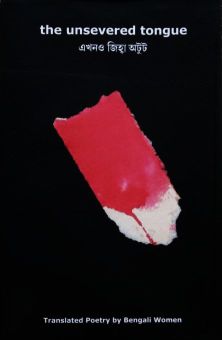

[searchable unicode Bangla text] | [Bangla text as images]
the unsevered tongue

kabita sinha (1931-1999)
Versatile poet and literateur. Married author and editor Bimal Choudhury at age 20, against the wishes of her family. Was involved in dissidence movements in the '50s. Addressed issues of woman's place vis-a-vis man in poems like AjIban pAthar pratimA (stone goddess, all my life) or apamAner janya fire Asi (because I crave your insults). Worked for All India Radio for many years, and edited a number of magazines. Also wrote under the pseudonym Sultana Choudhury.

|
|
|
alone like a Goddess
|
vijaya mukhopadhyay (1939-)
Born in Bikrampur (near Dhaka) in present-day Bangladesh. Vijaya
Mukhopadhyay has been writing poetry since her college days in
Calcutta. Her poetry is lyrical, with a lingering memory of many
yesterdays, as in

|
|
|
poetry: when you come
|
debarati mitra (1946-)
Born and educated in Kolkata, Debarati Mitra is a graduate from Jadavpur University, her work is firmly set in the post-modernist canon, with a lyrical allegory permeating much of her writing. Her delicately nuanced abstractions (e.g. smriti bale kicchu nei (memory, an emptiness) have been widely acclaimed, and she received the Ananda Puraskar in 1995. Much of her poetry evokes haunting surrealist images, as in jungle starwish or onomatopoeia in Tung here. She has a declared dread for all "-isms" and her poetry is largely apolitical on the surface, though many of the metaphors may reflect subtle social issues.

|
|
|
memory, an emptiness
|
namita chaudhuri (1949-)
Studied Bengali from the University of Jadavpur, (which has three of its alumnii in this selection), and is currently a schoolteacher in Kolkata. Her poetry is invested with a srong social sensitivity (see, e.g. jhulan JAtrA, kanyAke), often expressed with a delicate lyricism (fragmented words). With her husband, she is active in the group called Nandimukh saMsad, which participates in a wide range of literary and artistic activity. Has been involved in the Pakistan-India People's Forum, and is a member of the Kolkata International Foundation. As noted earlier, she is also the person responsible for suggesting the idea of this book.

|
|
|
fragmented words I
the broken-wing alphabets fragmented words II
every complete word |
mallika sengupta (1960-)
A professor of Sociology in Calcutta,
Mallika Sengupta's poetry is "unapologetically political". Of her
writings, she says: "A woman writing poems is always regarded as a
‘woman poet’ and never as a ‘poet’." While a good deal of
her writing focuses on women (e.g.
|
|
|
tongue
|
taslima nasrin (1962-)
A brutal honesty and fiery sense of outrage marks the work of Taslima Nasrin, and has made her a name a household word across South Asia and much of the West, but also cultivated fierce enemies in the conservative camps and made her an exile from her native Bangladesh. Her poetry has been reviled as unchaste and vulgar, but has gained a wide audience due to their honesty, sensibility, and relentless protest against the patriarchal constraints on women, (see e.g. ( boundary or ( don't listen, girl! ), and has won the Ananda Puraskar. A gynaecologist by profession, she practised medicine for many years before her literary calling overtook her life. One of the most widely translated Bengali poets, she is also the author of much acclaimed prose, including a series of newspaper columns and an autobiography.
|
|
|
boundary
|
mandakranta sen (1972-)
The passion for poetry led her to drop out of the MBBS program at Kolkata Medical College when only the final oral exams were remaining. Published hriday abAdhya meye (unruly girl, my heart), to wide acclaim in 1999, becoming the youngest recipient of the Ananda Puraskar the same year. Also awarded the Young Writer award from Sahitya Akademi in 2003. Along with her husband Also edits the magazine briShTidin. Poetry reflects original creative conjunctions of everyday experience which is the hallmark of all fine poetry. Some of her poems included here, (e.g. sharta deal with themes such as desire or loneliness.

|
|
|
nights with my TV
|
about the translator
amitabha mukerjee was born in Bangkok, schooled in Baghdad, Geneva, India, and the US, worked in New Zealand and German, and yet, somehow, he has managed to become a resolute Bengali. After a PhD from the Universiity of Rochester and a stint teaching at Texas A&M University, he joined I.I.T. Kanpur. By day he teaches Computer Science and researches in the area of Computer Vision and Natural Language Processing. By night, he writes. This book is his first.
contents preface gloss of culture words
Bengali text printed with permission. English text copyright amitabha mukerjee 2005